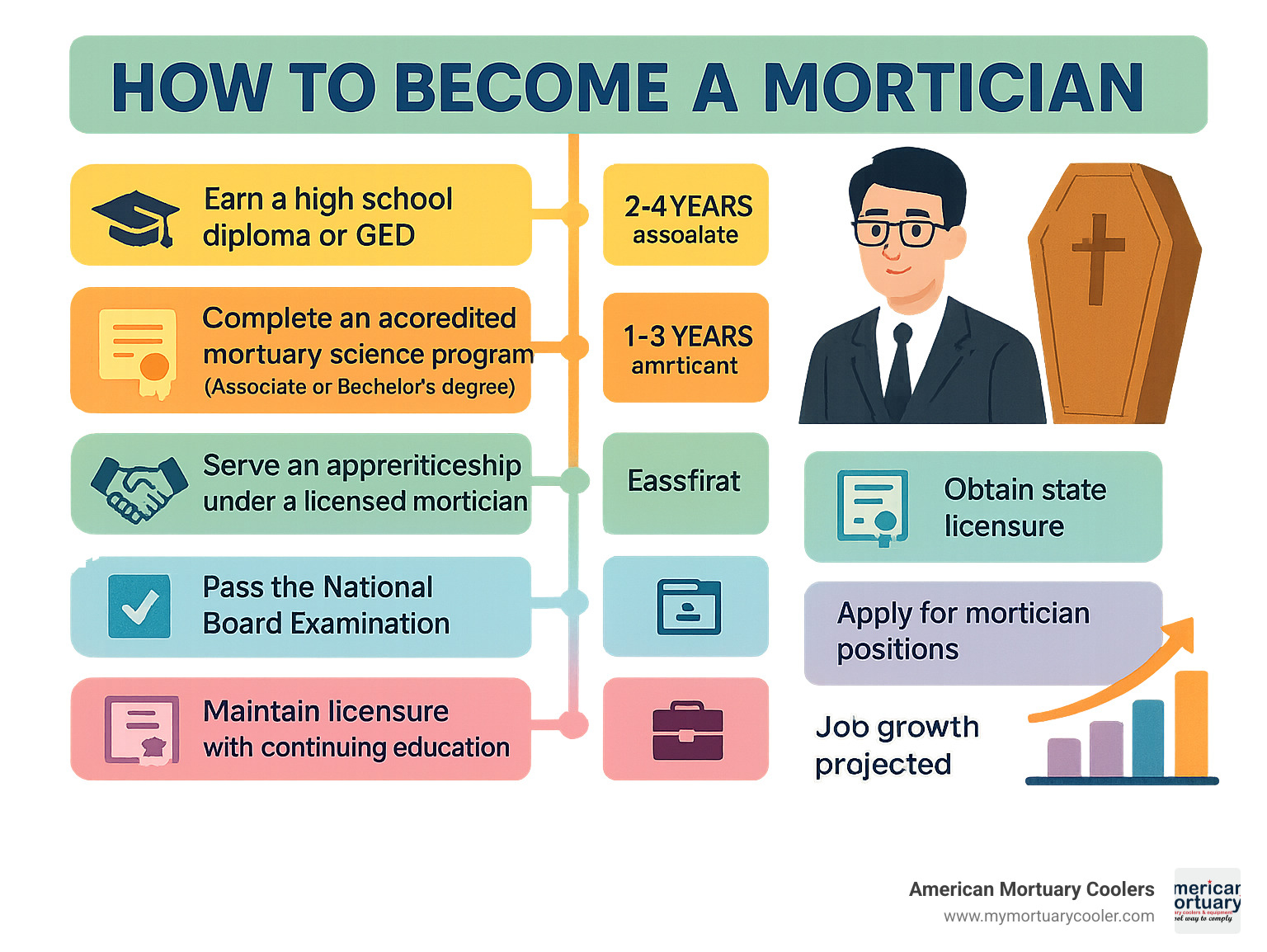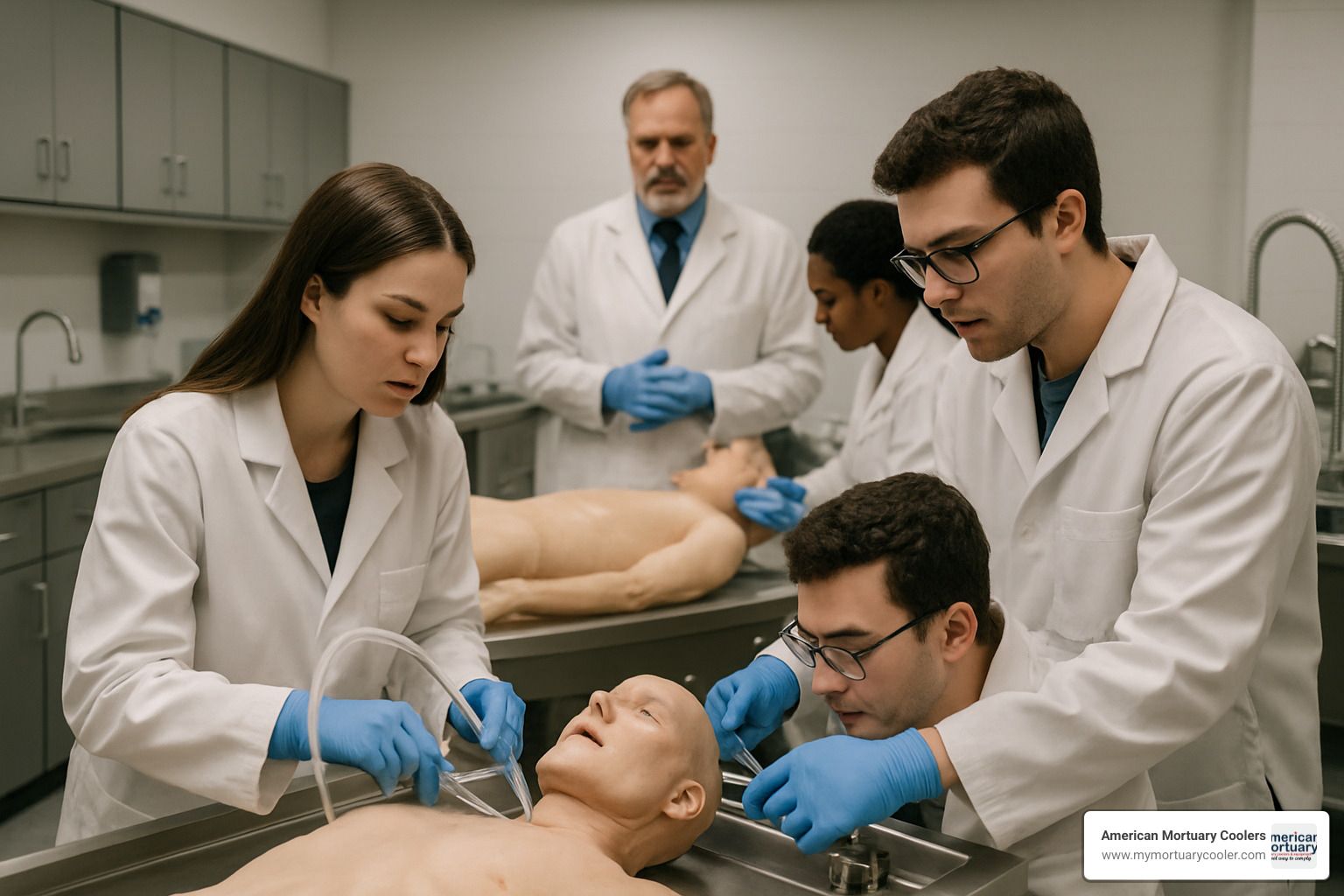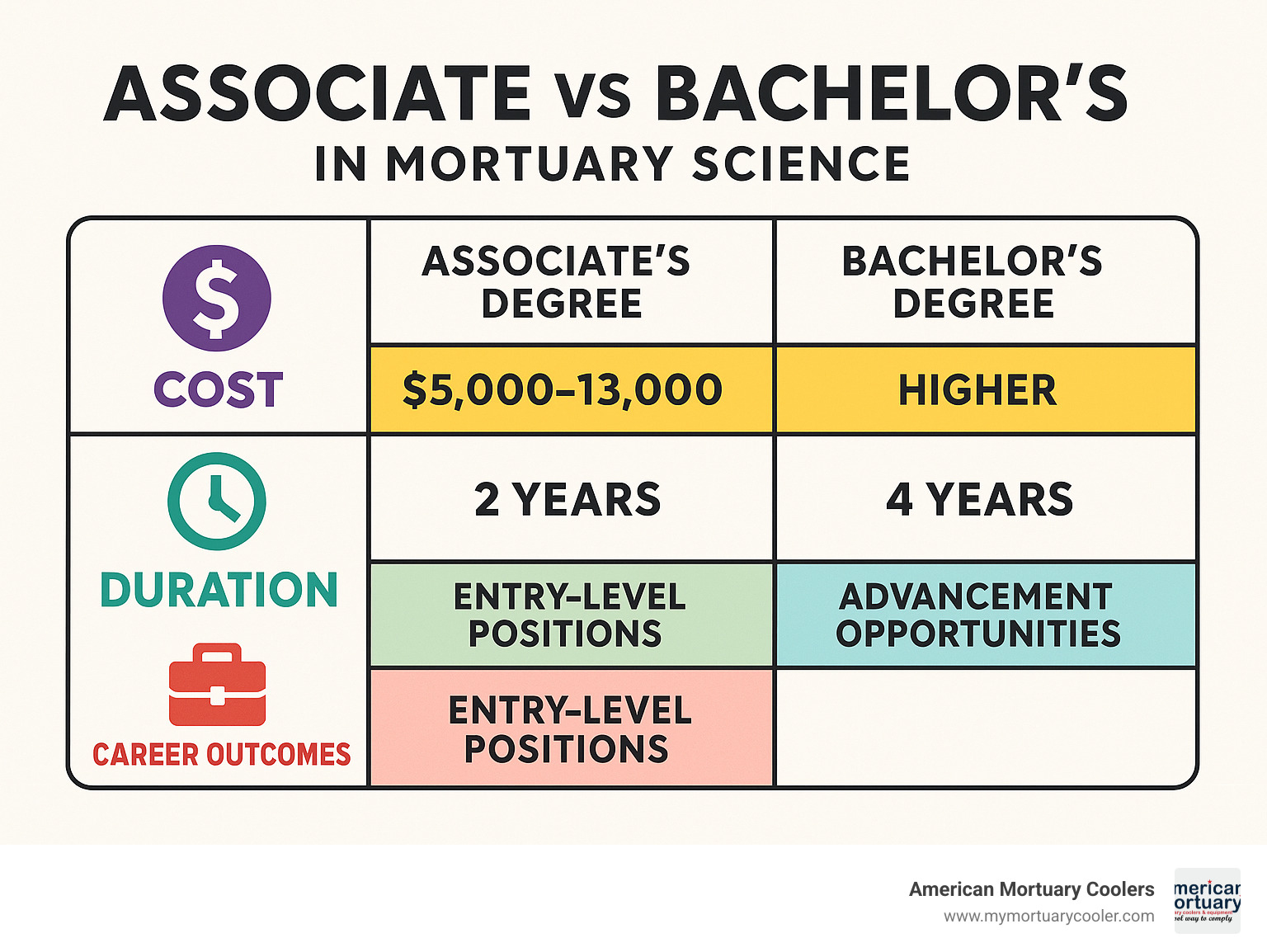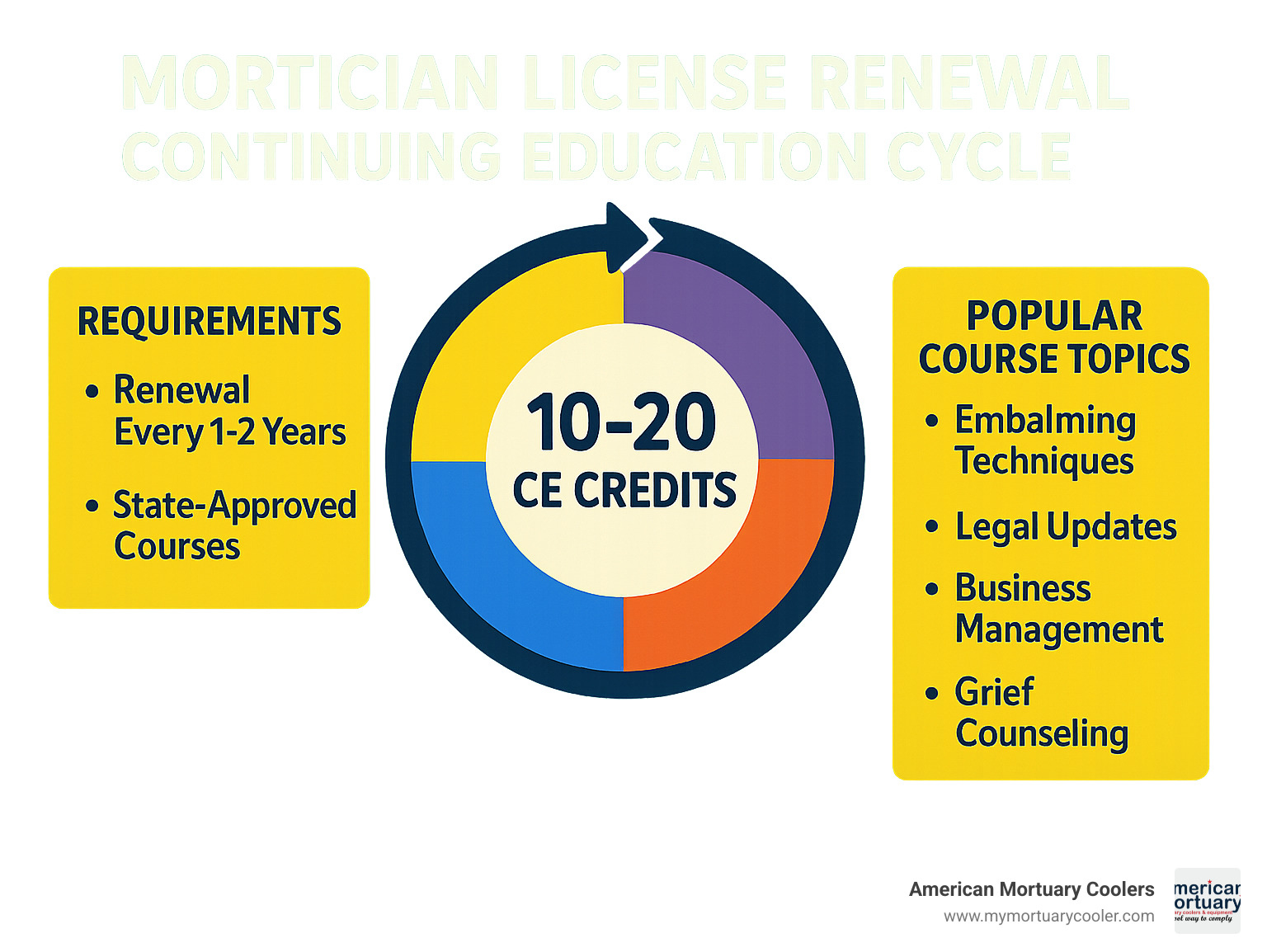The Compassionate Path to Funeral Service
How to become a mortician involves a combination of specialized education, hands-on training, and state licensure. For those seeking a quick overview, here's the essential roadmap:
- Earn a high school diploma or GED
- Complete an accredited mortuary science program (Associate or Bachelor's degree)
- Serve a 1-3 year apprenticeship under a licensed mortician
- Pass the National Board Examination
- Obtain state licensure (requirements vary by state)
- Apply for mortician positions at funeral homes
- Maintain licensure with continuing education
Morticians provide essential services during life's most challenging moments. While often viewed as a somber profession, mortuary science combines technical expertise, business acumen, and profound compassion to honor the deceased and support grieving families.
The profession offers stable employment with a median annual salary of $48,950, with top earners making over $83,550. With funeral service occupations projected to grow 8% by 2031, qualified morticians remain in steady demand across the country.
I'm Mortuary Cooler, and I've helped countless funeral professionals steer the path of how to become a mortician through my work supplying essential equipment to funeral homes nationwide.

How to become a mortician word roundup:
Step 1–2: What a Mortician Does & The Skills You Need
The journey of how to become a mortician starts with understanding what this meaningful profession truly involves. Far from the somber stereotypes, morticians serve as compassionate guides during life's most difficult transitions.
How to Become a Mortician: Role Overview
When people ask what morticians actually do, I explain that they're the steady hand that families lean on during their most vulnerable moments. Your daily responsibilities include:
Arranging and directing meaningful funeral services that honor someone's life story. Preparing the deceased with dignity through embalming, dressing, and cosmetic restoration. Coordinating transportation, completing vital legal paperwork like death certificates, and helping families steer insurance claims.
"Though it may seem like a dreary field," one veteran mortician told me, "it is much more than that. We honor and celebrate the life of the deceased."
Did you know the term "mortician" was coined in 1895 by The Embalmers' Monthly as a more dignified alternative to "undertaker"? Today, the role has evolved into something much more comprehensive – you're part counselor, part business manager, part community leader, and part technical specialist.
Personal Qualities & Soft Skills
Beyond formal education, certain personal qualities will help you thrive in this unique profession:
Compassion and empathy form the foundation of everything you'll do. This work requires emotional resilience too – the ability to support others through their pain while managing your own emotions.
Cultural sensitivity becomes essential as you help families of diverse backgrounds honor their traditions. Your communication skills will be tested daily as you explain complex processes to people who may be overwhelmed.
The best morticians possess incredible attention to detail, ensuring nothing falls through the cracks during services. They balance this with strong business acumen to manage operations effectively. Time management skills help them coordinate multiple services while meeting strict deadlines.

Self-care matters tremendously in this field. As one funeral director candidly shared, "Morticians themselves experience grief and need positive coping strategies." Developing healthy boundaries and stress management techniques is essential for a sustainable career.
For those wondering how to become a mortician, these human skills are just as crucial as the technical training you'll receive.
Want to peek behind the curtain of this profession? Learn more about what a typical day looks like in our detailed guide to a day in the life of a mortician.
Step 3–4: Education & Mortuary School Requirements
The journey of how to become a mortician truly begins with formal education. While compassion and people skills are essential, you'll need specialized training to master the scientific and business aspects of funeral service.
Mortuary Science Degrees & Coursework
The American Board of Funeral Service Education (ABFSE) is your north star in this process. They're the national accrediting agency that ensures your education meets industry standards. Currently, 57 ABFSE-accredited programs exist across the country, offering several paths:
Associate's Degree programs typically take about 2 years and represent the most common entry point. Bachelor's Degree programs require around 4 years but may open additional career opportunities, especially in management. Some states also offer Certificate Programs for those who already hold degrees in other fields.
Your coursework will include anatomy and physiology, embalming techniques, and restorative art. You'll also study funeral service psychology to help you support grieving families with sensitivity and care.
The business side isn't overlooked either. Classes in accounting, marketing, and operations prepare you to potentially run your own funeral home someday. Funeral law and ethics ensure you'll steer the legal requirements with confidence.

While some theoretical classes can be completed online, the hands-on aspects simply can't be learned through a screen. That's why many programs offer hybrid formats—online lectures paired with in-person labs.
Before applying, make sure you have your high school diploma or GED and check the age requirements (typically 18-21, depending on your state). Many programs also require prerequisite courses in sciences, psychology, and business. The average cost for a mortuary science program is about $23,753, though this varies widely depending on the school and program type.
For those wanting to dig deeper into the educational journey, our Beginners Guide to Mortuary Science and Embalming offers additional insights.
Licensing Exams, Apprenticeships, How to Become a Mortician in Your State
After graduation, your journey continues with exams and hands-on training.
The National Board Examination (NBE) is your first major hurdle. Administered by the International Conference of Funeral Service Examining Boards, this comprehensive exam covers everything you've learned. It's divided into Arts and Sciences sections, each with 170 multiple-choice questions. You'll need to score at least 75% to pass.
Many states also require their own State Board Examination and a Laws, Rules, and Regulations (LRR) Exam to ensure you understand the specific funeral service laws in your area.
Perhaps the most valuable part of your training is the apprenticeship or internship. Most states require 1-3 years working under a licensed funeral director, where you'll document your participation in funerals and embalming procedures.
As one veteran mortician told me, "Go for it. Go work in a funeral home and see what it's all about." There's simply no substitute for experiencing the day-to-day realities of funeral service firsthand.
The specific requirements for how to become a mortician vary depending on where you live. Some states let you complete your apprenticeship alongside your education, while others require you to finish school first. Colorado stands out as the only state with voluntary certification rather than mandatory licensing.
To get the exact requirements for your state, contact your state's funeral service licensing board or visit the National Funeral Directors Association website. The Bureau of Labor Statistics outlook also provides valuable information about career prospects in different regions.
Step 5: Time & Money—Program Length, Costs, Financial Aid
Let's talk about the investment you'll be making on your journey to becoming a mortician—both in terms of your time and your wallet.
The road to becoming a fully licensed mortician typically takes between 3-7 years, depending on which educational path you choose and what your state requires:
- Education: 2 years for an associate's degree or 4 years for a bachelor's
- Apprenticeship: 1-3 years of hands-on learning (varies by state)
- Examination and Licensing: A few months to complete all your exams
When it comes to finances, here's what you should budget for:
Tuition costs range from about $5,000 to $13,000 yearly for associate programs, with bachelor's programs typically running higher. Add $500-$1,000 per year for books and supplies, plus $500-$1,000 in application and examination fees. State licensing fees range from $100-$300 depending on where you live.

During the apprenticeship phase, you'll actually be earning while learning. Though apprentices generally start at lower wages, it helps offset some costs while you gain experience. According to the Bureau of Labor Statistics, established funeral professionals earn an average of $58,200 annually.
Several financial aid options can help make your education more affordable:
Federal aid through FAFSA opens doors to grants, loans, and work-study opportunities. Pell Grants are particularly valuable since they don't require repayment.
The funeral service community also supports its future professionals. The American Board of Funeral Service Education (ABFSE) offers several scholarships specifically for mortuary students. Many state funeral director associations provide financial assistance to students in their regions.
If you've served in the military, don't overlook your veteran benefits like the GI Bill, which can significantly reduce your educational costs.
Notable scholarship sources include the National Funeral Directors Association, Selected Independent Funeral Homes Educational Trust, the Funeral Service Foundation, various state funeral directors associations, and scholarships offered directly through individual mortuary schools.
At American Mortuary Coolers, we understand the significant investment you're making in your future career, which is why we're committed to helping new professionals find cost-effective equipment solutions as they establish themselves in the field.
Step 6: Job Outlook, Salary & Career Paths
So you've put in the work to learn how to become a mortician—what comes next? Let's talk about what you can actually expect in the real world of funeral service.
According to the Bureau of Labor Statistics, the field is projected to grow 4-8% from 2021 to 2031, faster than the average for all occupations. This steady growth means about 7,900 new job openings will become available each year.
When it comes to compensation:

The median annual wage for morticians nationwide sits at $48,950, but there's considerable range. The top 10% of earners make more than $83,550, while those just starting out might find themselves in the lower earnings bracket of under $31,470.
Geography matters enormously. If you're in Connecticut, you might be looking at earnings around $126,000, while professionals in Minnesota ($81,630), Massachusetts ($80,580), Indiana ($75,410), and Delaware ($73,460) also enjoy higher-than-average compensation.
"I never got into this work for the money," shared one funeral director I know, "but I've been pleasantly surprised by the stability it provides my family. Even during economic downturns, our services remain essential."
Beyond the traditional mortician role, your career could branch in several directions:
Funeral home management offers increased responsibility and compensation, with a median annual wage of $76,830. About 58% of funeral home managers are self-employed, suggesting there's plenty of room for entrepreneurial spirits in this field.
You might choose to specialize as an embalming specialist, focusing exclusively on the technical preservation aspects. Or perhaps you'll become a crematory operator, specializing in cremation processes as this option continues to grow in popularity.
Many professionals find fulfillment as a pre-need funeral planner, helping families make arrangements before the time of need. With growing environmental consciousness, becoming a green funeral consultant offers an emerging specialty.
Of course, the ultimate career path for many is funeral home ownership. After gaining experience, you might establish your own facility, creating a legacy business that serves your community for generations.
Some professionals prefer the structure of corporate funeral service, working within larger organizations that operate multiple locations.
What makes this career uniquely stable is its essential nature—regardless of economic conditions, families will always need compassionate funeral services.
At American Mortuary Coolers, we've noticed that the morticians who advance most quickly are those who invest in continuing education and stay current with industry trends.
Understanding Mortician Salaries
Step 7: Staying Current—Continuing Education, Tech & Trends
The journey of how to become a mortician doesn't end with licensure—it evolves into a lifelong commitment to growth and adaptation.
Most states have specific continuing education requirements to maintain your license:
- Typically 10-20 CE credits are needed per renewal period (every 1-2 years)
- Courses must receive approval from your state licensing board
- You'll study updated embalming techniques, legal changes, business management strategies, and grief counseling approaches
"The day you stop learning in this profession is the day you should consider retirement," a veteran funeral director once told me. The Academy of Professional Funeral Service Practice offers additional voluntary certification for those looking to demonstrate their commitment to excellence.

The funeral industry is experiencing fascinating shifts. Digital innovations have transformed how we serve families, with virtual planning meetings, online obituaries, and livestreamed services becoming standard offerings.
Green funeral options continue gaining traction as environmental consciousness grows. Natural burial, biodegradable caskets, and even human composting represent meaningful alternatives for families concerned about ecological impact.
The trend toward personalization shows no signs of slowing down. Today's families often request unique, celebration-of-life services that honor individuality rather than following rigid traditions.
Perhaps most striking is the changing demographic landscape of the profession itself. More than 70% of mortuary science students today are women, dramatically reshaping what was historically a male-dominated field.
Technical aspects of the profession continue advancing as well. Advanced preservation techniques and restorative art technologies evolve continuously, requiring morticians to regularly update their skills. Meanwhile, OSHA compliance remains a critical focus, particularly in facilities with specialized equipment.
Public perception of funeral service is also undergoing a positive shift. As one passionate mortician explained, "Learning about death doesn't have to be horrifying." Many funeral professionals now accept educational roles in their communities, helping normalize conversations about end-of-life planning.
At American Mortuary Coolers, we're proud to support funeral professionals through these evolutions. Our custom mortuary coolers and equipment incorporate the latest technology and safety features to meet the industry's changing needs.
The most successful morticians accept both tradition and innovation, honoring time-tested practices while adapting to meet the changing needs of the families they serve.
Your Path to Becoming a Funeral Director
Frequently Asked Questions about Becoming a Mortician
What is the fastest route to licensure?
The quickest path to becoming a licensed mortician typically involves a strategic approach:
Start with an associate's degree in mortuary science, which takes about 2 years to complete. The real time-saver comes in states that allow you to complete your apprenticeship alongside your education rather than after it. This parallel approach can shave a year or more off your journey!
When your coursework wraps up, take the National Board Examination right away while the information is fresh. Then submit your state licensure application as soon as you've met all requirements.
At minimum, expect about 3 years from start to finish, though 4-5 years represents the more common timeline for most funeral professionals.
How hard is the National Board Exam?
The National Board Exam isn't designed to be a roadblock, but it is comprehensive. It comes in two distinct parts:
The Arts Section covers the people-oriented aspects of funeral service—funeral directing, family counseling, business law, and regulatory compliance.
The Sciences Section focuses on the technical side—embalming techniques, restorative art, preparation procedures, and the scientific knowledge that supports these practices.
Each section gives you 170 minutes to answer 170 scored multiple-choice questions (plus 20 unscored pretest questions). You'll need to score at least 75% to pass.
The national pass rates tell an interesting story—about 78% pass the Arts section while around 69% pass the Sciences section. Successful morticians recommend starting your study routine months before the exam, using official study materials, forming study groups, and taking plenty of practice tests.
Can I complete mortuary school online while working?
Yes, you absolutely can balance work and education—with some practical limitations. The mortuary science field has acceptd hybrid learning models:
Most of your theoretical coursework can often be completed online on your own schedule. However, certain skills simply can't be learned through a computer screen. Embalming techniques, restorative art, and other hands-on skills require in-person laboratory sessions.
Many programs now specifically cater to working adults with evening and weekend options for these necessary in-person components. I've seen funeral homes that even adjust employee schedules around their mortuary science classes.
If you're planning this route, reach out directly to program directors to discuss flexibility options and consider part-time enrollment to maintain balance. Even better, try to find employment at a funeral home while studying—many states will count this toward your apprenticeship requirements.
Conclusion & Next Steps
The journey of how to become a mortician combines dedicated education, hands-on experience, and a heartfelt commitment to serving others during their most vulnerable moments. While this career requires significant investment, it rewards you with a stable, deeply meaningful profession where you can make a genuine difference every day.
If you're feeling drawn to this profession, here are some thoughtful next steps to consider:
Research several ABFSE-accredited mortuary science programs, paying special attention to those that might offer flexible scheduling or hybrid learning options. Take your time comparing programs—this decision shapes your entire career foundation.
Reach out directly to your state's funeral service licensing board. Every state has different requirements, and understanding these early will help you plan your educational journey more effectively.
Visit local funeral homes and introduce yourself. Most funeral directors remember what it was like starting out and are willing to share their experiences. A brief conversation could evolve into a job shadowing opportunity or even a part-time position.
Start your financial planning early by researching and applying for scholarships and financial aid. The ABFSE, state funeral director associations, and individual mortuary schools all offer funding opportunities specifically for aspiring funeral professionals.
Begin developing relevant soft skills through volunteer work with hospice organizations or grief support groups. These experiences build empathy and communication abilities that will serve you well throughout your career.
Here at American Mortuary Coolers, we've been privileged to support countless funeral professionals throughout their careers. From our home base in Tennessee, we ship our durable, custom-designed mortuary equipment directly to funeral homes across the lower 48 states. We understand that reliable equipment forms the backbone of exceptional funeral service, allowing you to focus on what matters most—caring for families.
The mortician profession certainly isn't for everyone—but for those who possess that special blend of technical aptitude, business sense, and a genuinely compassionate heart, this career offers rewards that go far beyond financial compensation. As one of our longtime funeral director clients beautifully expressed, "Although this career is not for everyone, the right candidates will find lifelong satisfaction in knowing they helped families through their darkest hours."

















